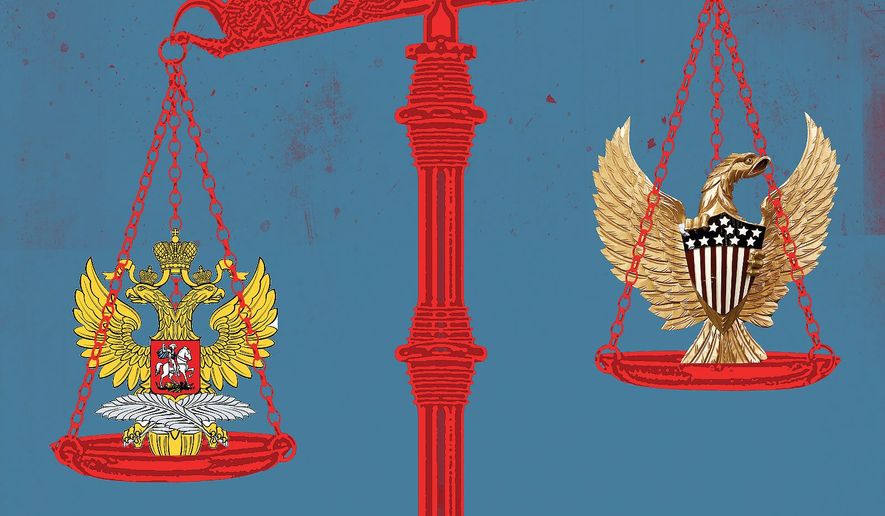OPINION:
Here we are. The thought of the Russian Federation invading its neighbor seemed like a pipe dream not long ago, but Russian President Vladimir Putin has once again thrown the chessboard off of the proverbial geopolitical table.
Mr. Putin’s miscalculation may have cost the Russian state, and its people, a price that they are unwilling and unable to pay. Analysts have taken the stance of assuming that Chinese President Xi Jinping’s loyalty to Mr. Putin may save the Russian economy, but that assumption is flawed when taking into account China’s clear and unambiguous goal of assuring a global order that is shaped by and safe for the Chinese regime.
China’s Foreign Ministry has already signaled its willingness to be a constructive partner, if not the predominant mediator in the Russia-Ukraine conflict. This makes perfect strategic sense as both countries are significant partners in China’s Belt and Road Initiative, an all-encompassing infrastructure plan that can be surmised as an autocracy’s answer to the United States’ Marshall Plan.
This unprovoked war has inflicted a toll on the world unseen since the early 20th century, but the fallout may advance the global power of America’s greatest long-term ideological and geopolitical adversary.
The New Eurasian Land Bridge could be described as China’s most publicly successful BRI project within the context of physically connecting Asia to Europe to facilitate cross border trade.
China seeks to continue this fruitful venture by maintaining stability within Eurasia, allowing for a free-flow of goods from the mainland westward. China’s main priority throughout this crisis is to ensure that its economic initiatives maintain forward progress, and as a result, it may take a hefty financial and diplomatic stake into the region to ensure its interests are sustained.
China is already considering the vast allocation of capital inflows to Russia’s state-owned enterprises, including Gazprom and Rosneft; and such scenarios have already been published in Western media. Mediation of the conflict will allow China to safeguard its interests and export capacity to Europe, while providing it with another self-proclaimed political win on the international stage.
Chinese investment into the Russian economy portends to be the only logical solution to Russia’s current financial dilemma. This will eventually lead to a “carving up” of Russia’s spheres of influence and control over its domestic and political agenda. Investments into the oil and natural gas sectors will likely be contingent upon China’s control of corporate decision-making, or even facilitated by loans with exorbitant interest rates akin to China’s projects in Africa.
Eventually, China will own Russia’s natural reserves leaving the country to become a vassal state much like Mr. Putin envisioned Ukraine to be. China will further capitalize on the vacuum of influence in Central Asia to assert its dominance.
China-Russia relations vis-a-vis Central Asia have long been contentious, and this geopolitical shift will enhance China’s BRI initiatives in Kazakhstan, Uzbekistan, et. al. Putin had long believed that Central Asia remained in Russia’s sphere of influence due to its prior subjugation under the Soviet Union. These events will open China’s drive into the region and secure its dominance.
China may also benefit from Russia’s predominance in the Arctic Region. Should Russia become heavily reliant on Chinese financing to prop up its regime, China will likely have a stronger hand to push for its membership into the Arctic Council and finally surpass its observer status. This will allow Beijing to have a greater say in Arctic initiatives, affording it the opportunity to shape policy in accordance with its interests for shipping routes and scientific projects which will yield benefits for its space and military programs.
China may use its playbook for encroachment within the South China Sea against the Arctic, and this should be of concern to the greater international community. In short, Russia’s fall may have precipitated China’s rise in the international sphere for the long-term.
How then can the U.S. fortify its standing and ensure its place in the world? First, the country must solve its energy dependence issues. In the short term, America can import a substantial amount of oil from Latin America through Venezuela and even Canada to alleviate immediate concerns of rising prices.
Unpalatable as it may be, we have geographically proximate neighbors that can provide a quick band-aid to the current problem. More importantly, the administration must ensure the opening of reserves to include the Keystone Pipeline to reinvigorate domestic production and export capacity. It is common sense, energy independence should be a priority of Washington when the world is currently terrified of a lack of production.
Increasing production will also leave Russia with few levers left to terrorize the rest of the world. Secondary sanctions against China’s transactions with Russia’s energy sector would also stem China’s capitalization on Russian investments.
China also uses the U.S. dollar for the majority of its international transactions, and its exposure to the U.S. remains vast. Therefore, ensuring the dominance of the dollar globally is paramount to the success of the United States and the West at large.
The U.S. must encourage allies, partners and even fringe associates to use the dollar in the course of normal financial activity and promote multilateral initiatives such as the Millennium Challenge Corporation and other dollar-dominant institutions to provide alternatives to China’s BRI projects.
Leaders should also emphasize the positive impact for growth the dollar and the liberal international order facilitates for the globe, while messaging the potential negative impact a Yuan-dominated system may have for global commerce and free market access. China may benefit greatly in the short term from Russia’s horrible and tragic decisions, but the West can still guide the future if it so chooses.
• M. Roberts is a national security analyst focusing primarily on East Asian and Eurasian affairs for the U.S. Government.




Please read our comment policy before commenting.